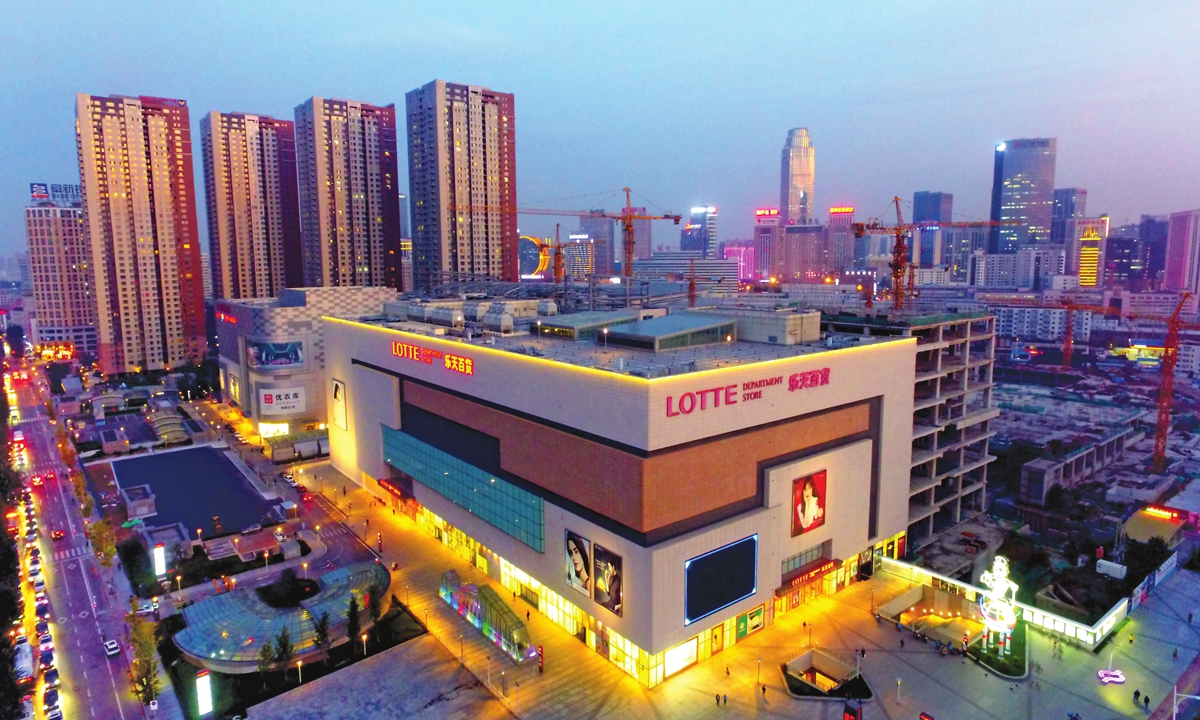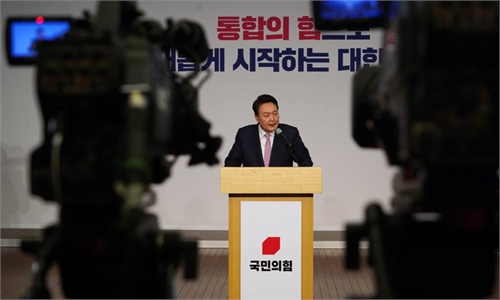South Korea's Lotte’s reported exit from China shows foreign business should embrace the changes and trends in Chinese economy: experts
Lotte’s reported retreat from Chinese market shows South Korean firm’s failure to adjust

A Lotte department store in Shenyang, Northeast China's Liaoning Province on September 19, 2019 Photo: VCG
Lotte Group, one of South Korea's largest holding companies is set to liquidate its China headquarters after many of its subsidiaries downsized their presence in China, the Chosun Ilbo reported on Wednesday.
A Lotte Group official said, "We have been discussing the liquidation from the end of last year, and it is expected that the Chinese headquarters will be disbanded after completing administrative procedures in the first half of this year, " according to the report.
The retail conglomerate Lotte has seen its business shrinking in China and losing market share after the company in 2017 has announced support for the Terminal High Altitude Area Defense (THAAD), a move that angered many Chinese people who then called for a boycott of Lotte's business in China.
Analysts have noted that the failure of Lotte is mainly caused by the fact that it has not properly adjusted their marketing strategies in response to the changing buying habits of Chinese customers despite THAAD deployment triggered Chinese consumers' boycott to the brand.
Change of Market
Lotte Group launched its operation in Chinese market in 1994 and major affiliates such as Lotte Mart, Lotte Department Store entered China in the form of joint ventures.
In 2012, the group established a new headquarters in Shanghai, a corporate organization comprised of Lotte Shopping, Lotte Corp, and Lotte Chemical to aggressively advance its business in Chinese market.
Lotte Group Chairman Shin Dong-bin was targeting group sales of 200 trillion won ($164 billion) in 2018 with China being a key strategic market, media reported.
However, shortly after the ambitious goal was formed its business began shrinking quickly in China.
In 2017, Lotte Group had 130 outlets in China including five department stores and 112 discount stores and 12 cinemas, according to the Lotte Shopping Annual Report 2017. The number of outlets was quickly reduced in the following two years. As of 2019, Lotte ran two department stores and 12 cinemas in China, said the 2019 annual report.
The brand's business in China has been struggling since Chinese consumers were angered by the group's decision in 2017 to sell a golf course to the South Korean government as a host site for THAAD. However, the geopolitical reason was only a trigger, experts said.
The geopolitical reason can hardly uproot the operation of South Korean enterprises like Lotte in China, as most Chinese consumers are rational when they shop and South Korean brands are still relatively welcome among Chinese consumers, Zhang Yi, CEO of iiMedia Research Institute told the Global Times on Monday.
He noted that China's production capacity and industrial structure has been developing and advancing faster than South Korea, which has affected the operation of South Korean companies in China.
Meanwhile, consumption behavior in China has been consistently evolving and changing following the robust development of China's internet industry. However, South Korean enterprises have not been able to catch up with new trends and respond to changes in the market, while still carrying out outdated strategies to target the Chinese consumers, said Zhang.
As foreign retail giants like Lotte was expanding in the lucrative market in China, Alibaba, one of the leading Chinese e-commerce platforms started the Singles' Day shopping festival a decade ago. In 2021, Alibaba's Tmall reported sales of 540.3 billion yuan ($84.93 billion) during the Singles' Day shopping spree, a record high.
Lotte appears to have not effectively integrated online and offline platforms in areas such as convenience, so consumers would prefer shopping on other Chinese platforms and even Walmart offers more convenient and efficient services, Zhang noted.
Change of Customers
Lotte is not the only South Korean brand to downsize its business in the Chinese market.
Earlier this year, HERA, a high-end South Korean cosmetic brand under AmorePacific, recently announced that the brand is shuttering its bricks and mortar stores across China. Innisfree also reportedly closed down 80 percent of its stores in the Chinese mainland in January to a total of 140 stores from a peak of more than 800 stores.
The Chinese market has seen a new generation of consumers emerge, with the majority of people born between 1995 and 2000 changing their consumption habits, Zhang said.
The influence of South Korean culture on this generation is not as deep as on previous generations, according to Zhang, noting that the cultural output is relatively less and South Korean brands are less appealing to younger consumers.
After entering the Chinese market, South Korean companies have failed to display sufficient innovation and digital transformation especially in competing with the rapid progress made by Chinese companies, Bo Wenxi, chief economist at wealth management firm IPG China, told the Global Times on Monday.
Moreover, South Korean enterprises have not fully achieved localization with their operating models in China, Bo added.
Even though some South Korean brands, are retreating from the Chinese market, overall trade and economic cooperation between the two countries remains vibrant.
In 2021, bilateral trade between China and South Korea reached $362.35 billion, an increase of 26.9 percent year-on-year, official data from the Chinese General Administration of Customs showed.
Lotte's withdrawal showed that with the development and progress of China, many enterprises and products that we once thought had advantages have lost their shine and competitiveness, Liu Dingding, a veteran industry observer told the Global Times on Monday.
"However, China is big enough and the consumer market is so big that it still offers a lot of opportunities for countries around the world," Liu said.
Lotte's withdrawal plan from China is a reminder for other foreign companies operating in the market not to underestimate the progressing and innovation within the Chinese economy. These companies should increase their localization efforts and actively embrace the changes and trends happening in relevant Chinese industries, Bo said.


